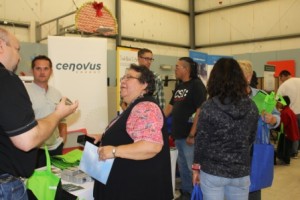When Pimee Well Servicing approached Cenovus Energy with a proposal for a new oil well service rig in early 2013, both parties could see potential benefits but neither expected such a solid partnership to be the result. Pimee is an Aboriginal-owned oilfield service company based in northeastern Alberta with a mandate to not only provide leading oilfield services, but to increase employment opportunities for Aboriginals. Cenovus is a Canadian oil company with oil sands projects in northern Alberta whose management team and staff also work to develop opportunities for business partnerships and employment in the communities near its operations.
Since that time, the rig has been installed and is now in service at Cenovus’s Christina Lake oil sands operation in northern Alberta. Whitefish Lake First Nation Chief James Jackson praises the partnership between Cenovus, Pimee and his community. He says the training and employment for community members working for Pimee are making a positive impression on the younger generation by showing them the benefits of education, training and having industry as a neighbour.

Cenovus uses a rigorous engagement process that involves both formal contact – like presentations and open houses – and informal contact – like one-on-one conversations with Aboriginal people living near its operations.
For its part, Cenovus wants the communities close to its operations to be better off as a result of its development activities. “Our closest neighbours are First Nations and Métis communities and we work hard to build relationships with them based on mutual trust and respect,” says Trent Zacharias, Cenovus’s Manager of Local Community Relations. “We want to meet our goals while ensuring our neighbouring communities achieve their goals as well.”
Cenovus has three projects situated near First Nations and Métis communities. Two are operating oil sands projects – Foster Creek and Christina Lake – and the third, Narrows Lake, is now in the construction phase. The three projects are jointly owned with ConocoPhillips and operated by Cenovus. Foster Creek is located on the Cold Lake Air Weapons Range, within the traditional territory of Cold Lake First Nations (CLFN), while the Christina Lake and Narrows Lake projects are near the Métis communities of Conklin and Chipewyan Prairie First Nation.
Hiring locally and doing business with local suppliers and contractors whenever possible is one way Cenovus supports the communities near its operations. This approach has led to strong working relationships with a growing number of successful Aboriginal-owned joint ventures and businesses.
CLFN is a good example of a community that’s grown its business capacity significantly. Many of Cenovus’s preferred contractors at the Foster Creek operation come from CLFN. One of these contractors, Primco Dene, began operations with 50 staff in 1999 and now employs more than 800 people who originate from 50 different Aboriginal communities across Alberta, Saskatchewan and B.C. The company provides catering, janitorial, maintenance, emergency medical, IT, security, and commercial franchises.
Cenovus says it’s proud to be part of the success of a number of multi-million-dollar Aboriginal-owned joint ventures and businesses, including Seven Lakes Oilfield Services, TAWS Security, and Dechen Corp. These companies provide Cenovus and other oil producers with camp catering and maintenance, well servicing, site security, forestry and earthworks services.
“The Cenovus contract was make or break for us,” says TAWS Security founder Isabell Ringenoldus. “It was the deciding factor between whether we were going to stay small, with just me working, or become a growing company.” TAWS went from a three-person company in 2007 to the success story it is today with 106 employees, a fleet of 30 security trucks and eight mobile security trailers.
Brian Ferguson, Cenovus President & Chief Executive Officer, says his company has significant development plans for its oil sands business over the next several years, and the support and participation of communities near Cenovus’s projects will be crucial to its success. In the third quarter of 2014, the company’s Foster Creek and Christina Lake projects produced an average of more than 125,000 barrels of oil per day, net to Cenovus, and the company is continuing to grow its oil sands production. At the same time, Cenovus’s investment in Aboriginal-owned joint ventures and businesses is also growing. Since 2009, it’s increased from $86 million to nearly $400 million in 2013.
But building and maintaining strong relationships with Aboriginal communities takes more than just developing business partnerships. To ensure a consistent and comprehensive approach when working with the communities in its operating areas, Cenovus developed its own Aboriginal engagement framework. The framework addresses things like community consultation, community investment, employment, and long-term agreements. Since 2010, the company has signed multi-decade agreements with seven Aboriginal communities and is hoping to sign more. The agreements establish specifics about how the company will work with a community throughout the life of its oil sands projects, how the parties will communicate and resolve issues, and what types of support and funding a community can expect. Funding can be used for things like education and job training, community projects, cultural preservation and development.
“These agreements provide certainty for the communities about how committed we’re going to be to them well into the future,” says Trent Zacharias. “And they provide certainty for us as we continue to develop long-term plans to expand our oil sands operations.”
To fully understand the needs of a community, Cenovus uses a rigorous engagement process that involves both formal contact, such as presentations and band council meetings, and informal contact, like one-on-one conversations with the First Nations and Métis people near its operations. Through this engagement process, Cenovus has gained two key learnings:
– it needs to understand the obstacles preventing communities from realizing their developmental goals
– it then needs to identify existing abilities and develop opportunities that will allow communities to achieve sustainable results
By helping community members acquire skills, companies like Cenovus not only open up job opportunities, but contribute to a vibrant, sustainable community for residents. Cenovus also gains a reliable and local workforce.
Creating employment opportunities
One of the biggest challenges facing the company is ensuring there will be enough skilled workers available for Cenovus to continue expanding its business. The opportunities for companies and individuals wanting to work in the oil sands in northern Alberta are plentiful and these prospects will continue to grow over the next decade and beyond. But competition for skilled workers in the oil sands is intense and it’s expected to become even more so in the next few years as industry grows and projects multiply. Aboriginal communities in northern Alberta represent a large and relatively untapped pool of potential labour. The challenge is, people in many of these remote communities have limited access to the resources and training they need to become power engineers, welders, electricians or any of the other kinds of skilled workers energy companies are looking for. For this reason, Cenovus developed its Employment Bridging Internship (EBI) program as a way to provide training and potential employment to First Nations and Métis people who show potential and are interested in working in the oil and gas industry.
The program offers on-the-job learning opportunities to candidates from First Nations and Métis communities near Cenovus’s operating areas. The company launched the internship program in partnership with the Alberta Government and regional post-secondary institutions in the spring of 2012 at Cenovus’s Foster Creek project near the community of Cold Lake First Nations. Later that year, the pilot program was extended to Cenovus’s Christina Lake operations near the communities of Conklin and Chipewyan Prairie First Nation.
“Cenovus wants people from Aboriginal communities to come and build a career with us,” says Maureen Sander, Senior Recruitment Advisor based in Cold Lake. “Through this program, we’re providing paid internship opportunities for First Nations and Métis people who are interested in working in the oil and gas industry. It’s a good way for people to learn new skills and also try out the work environment to determine if they’re on the right career path.”
Candidates who qualify for the internship go through three to four weeks of pre-employment training to help them build the soft skills they’ll need in the workplace, like health and safety and computer training. Once they’ve finished the pre-employment phase, the interns are hired as contract workers where they receive paid, on-the-job training for one to two years depending on their skill level and the requirements of the job. Since the interns are matched to specific job openings at the company, the number of available internships varies from year to year. And though the company doesn’t directly cover the cost of tuition, interns are eligible to apply for a scholarship through Cenovus’s Aboriginal Scholarship Program.
Scott Muskego of Cold Lake First Nations was one of the EBI program’s first participants and has now been hired as a full-time Cenovus employee. “Cenovus’s Employment Bridging Internship program gave me the tools and experience I need to achieve my goals. The company is sensitive to Aboriginal issues and goes the extra mile to ensure that communication, both on the worksite and in the communities, is ongoing and meaningful.”
Four participants involved in the pilot project are now working full-time at Cenovus’s Foster Creek operations, and nine new intern positions have been created and filled since September.
“From our perspective, the opportunities for companies and individuals wanting to work in the oil sands industry in northern Alberta will continue to grow over the next decade,” says Brian Ferguson. “For Cenovus to have success, neighbouring First Nations and Métis communities must also succeed as our projects are developed.”



My name is BOB IRELAND IM A BAND MEMBER OF L iidlii Kue First Nation,as amember of the community of FORT SIMPSON N.W.T
I”d like to know if there are any possibilities of employment with Cenovus,
Im aB pressure welder with 20 years experience which includes pipeline welding various tickets CWB